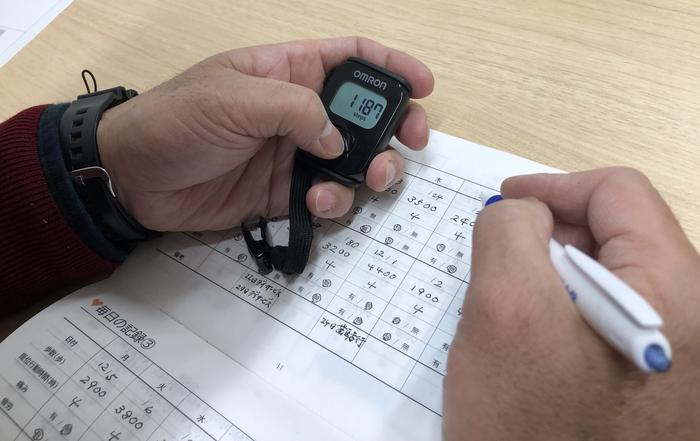Self-monitoring of physical activity with an accelerometer and feedback is an effective tool to improve physical activity in elderly people requiring long-term support. The Kobe University study is the first to show that with simple and safe means the physical activity of this demographic can be improved, which is expected to help prevent serious illness and reduce costs for long-term care.

Credit: IZAWA Kazuhiro
Self-monitoring of physical activity with an accelerometer and feedback is an effective tool to improve physical activity in elderly people requiring long-term support. The Kobe University study is the first to show that with simple and safe means the physical activity of this demographic can be improved, which is expected to help prevent serious illness and reduce costs for long-term care.
Taking more steps and sitting less is well known as having a significant influence on a wide range of noncommunicable diseases such as heart disease, diabetes, orthopedic diseases and stroke. This is particularly problematic in senior citizens who depend on long-term care such as in day-care centers, as it is known that they take fewer steps and spend more time sitting than healthy people of similar age. The resulting higher risk of falling ill not only decreases health-related quality of life in these people, it also stretches already scarce resources in healthcare systems. And while it is known that self-monitoring can improve the physical activity even among the elderly, the effectiveness of this approach has not been shown for this high-risk demographic.
The Kobe University research team of health scientists IZAWA Kazuhiro and KITAMURA Masahiro filled this gap by conducting a comparative analysis with 52 long-term care patients at a day care center in Japan on the effectiveness of self-monitoring of physical activity. They educated the participants on the importance of increasing physical activity and asked participants to wear accelerometers that record steps, sitting time and activity of various intensity. The 26 participants in the intervention group were additionally asked to record their progress in a calendar daily and received weekly feedback and advice.
The results now published in the journal European Geriatric Medicine show that the intervention group took more steps, spent less time sitting and were more engaged in light physical activity. The authors write, “The results of this intervention promoting physical activity in this target population were novel to this study. Older people with long-term care needs have reduced mobility and activity compared to healthy older people, so increasing physical activity is not easy. However, goals such as increasing the number of steps can be easily understood and practiced, and reducing the time spent in sedentary behavior, such as by standing or taking a short walk, are activities that can be performed indoors and do not require high mobility.”
Since this was the first study to include not only on steps in the self-monitoring but also time spent sitting, it is possible that these two affected each other. The Kobe University researchers explain, “A previous study in healthy older people reported that moderate to vigorous physical activity increases when sedentary behavior decreases, which is somewhat similar to the findings in the present study.” Izawa adds, “While traditional self-monitoring interventions have focused primarily on the number of steps taken, this study focused on both steps taken and sedentary behavior. As a result, we believe this may have facilitated their behavior change.”
While this study clearly shows the effectiveness of such simple measures as wearing an accelerometer, self-monitoring and receiving feedback on one’s progress on the physical activity, its five-week period was too short to capture actual benefits on health-related quality of life. Izawa and Kitamura say, “The results of this study may serve as an important foundation for future research on promoting physical activity among older adults in need of assistance. In particular, self-monitoring interventions have been shown to contribute to improved physical activity and can be applied to care prevention strategies. Future studies should include larger samples, a broader range of activities and long-term follow-up to verify the sustained effectiveness of the intervention.”
This study was supported by JSPS KAKENHI grants numbers JP22K11392 and JP23K16629 and Reiwa Health Sciences University’s University Support Research Fund 2022. It was conducted in collaboration with researchers from Reiwa Health Sciences University and with the Rifuru Yukuhashi Daycare Center.
Kobe University is a national university with roots dating back to the Kobe Commercial School founded in 1902. It is now one of Japan’s leading comprehensive research universities with nearly 16,000 students and nearly 1,700 faculty in 10 faculties and schools and 15 graduate schools. Combining the social and natural sciences to cultivate leaders with an interdisciplinary perspective, Kobe University creates knowledge and fosters innovation to address society’s challenges.
Journal
European Geriatric Medicine
DOI
10.1007/s41999-024-00935-w
Method of Research
Randomized controlled/clinical trial
Subject of Research
People
Article Title
Effects of self-monitoring using an accelerometer on physical activity of older people with long-term care insurance in Japan: a randomized controlled trial.
Article Publication Date
14-Feb-2024




